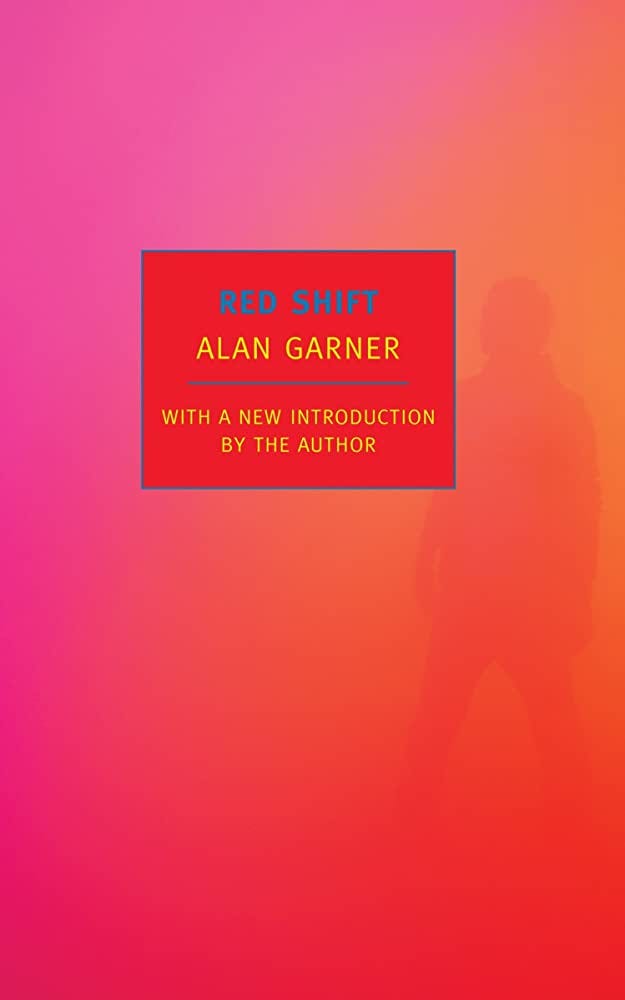Red Shift by Alan Garner (Collins, 1973)
In Roman Britain, the dregs of the lost Ninth legion decide to go tribal: they grow their hair, paint their skin, adopt the accent and vocabulary of the tribes around them, and set up camp on top of a hill called Mow Cop. There is an old quarry up there; they fear to enter. One of them kills with an ancient axe, which he eventually buries in the dirt. Most of them die before the end of the book.
In the English Civil War, the people of the town of Barthomley, a few miles from Mow Cop, take shelter in their church tower as enemy forces advance. They hope for sanctuary, but it is not granted; they are smoked out. Two of them find an ancient axe head in the dirt, treasure it, and eventually hide it in a chimney. Most of them die before the end of the book.
In 1970s Britain, which is when this novel was published, Jan moves to London to study nursing and leaves her boyfriend Tom behind. They meet regularly in Crewe, and cycle out to Barthomley and up to the folly on Mow Cop. They find an ancient axe head in a chimney, and take turns looking after it. Neither of them die before the end of the book. However, Tom manages to do something unspeakable with the axe head.
Ursula Le Guin called Red Shift as “A bitter, complex, brilliant book.” This is correct in all three points, but the most interesting word there is bitter. What could we mean, when we say a book is bitter?
Perhaps it means that the novel puts forth a bitter characterisation of human existence: here is violence and here, later, is also violence, and further on we have yet more violence, of its own kind. Dig up the dirt or look up the chimney and you’ll find an axe, and the edge will still be true.
Perhaps that means that the experience of reading the novel leaves a nasty taste in the mouth. And it does, although I accorded this novel the highest compliment I know - I finished it and then immediately read the whole thing again from start to finish.
Perhaps we might even look towards a bitterness of form, if that makes sense. Sharp and slick, lean and acrid; a novel that stings your nostrils like the smell of burning hair.
Magoo pushed the girl down the path. She fell, and he maimed her as she lay.
All creative writing is a mutual act of creation, writer and reader labouring in some mutual proportion, but Garner makes you do much of the heavy lifting. Long stretches of dialogue go unattributed, scenes shift without being signposted, and almost all the characters go entirely undescribed. There might be a little trace of bitterness there, too, author to reader. Do your share.
Themes, phrases and motifs echo through the time frames, back and forth and back again, but nothing resolves with any evident neatness. You have to work, and even then you don’t know if you’ve quite got it; indeed, to push through to any kind of definitive reading would seem almost inappropriate.
“Will you listen? Please.”
“Well?”
“Are people more important than things?”
“Eh? Why’s he talking like a blocked drain?”
“He’s morbid.”
“Are people more important?”
“Than what?”
“Things.”
In the introduction to the NYRB version, printed in 2011, Garner takes seriously the much-mocked question ‘where do your ideas come from?’ In the case of Red Shift: a folk rumour, a newspaper clipping, a chunk of bloody history and a piece of graffiti. And time. Seven years in all. “The way I write,” he says, “is to make connections between disparate images, which then draw in more images unsought, making more connections.”
That’s how he reads, too: connection after connection after connection, never quite arriving at anything so easy as a destination. Anything that would let you stop. Are these resonances through time glimpses of some great universal truth, or are they empty echoes, dumb brute animals endlessly repeating the same loops of dumb brute animal violence and dumb brute animal love. Perhaps those two possibilities aren’t mutually exclusive.

